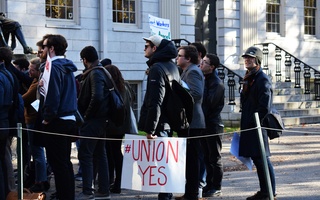{shortcode-8aa67d82433704ff354235a104c27f26bfb761e8}A National Labor Relations Board official has ruled that a student unionization election held at Harvard last fall was invalid and called for another vote on the matter, a decision the University plans to contest.
John J. Walsh, Jr., Regional Director of the the National Labor Relations Board, wrote in his July 7 decision that a list of eligible voters generated by Harvard before the election “interfered with the employees’ exercise of a free and reasoned choice” in the vote, according to a Facebook post by union organizers.
In an email to students sent on July 10, Director of Labor and Employee Relations Paul R. Curran wrote Harvard intends to appeal Walsh’s decision to the national NLRB.
“The University believes strongly that the November 2016 election results, which reflect the votes and voices of the majority of eligible voters, should stand,” he wrote. “Harvard will ask the NLRB in Washington, DC, to review the regional director’s decision.”
The ruling is the latest development in the drawn-out legal saga between the University and the union organizers since the initial election in November 2016. February and March, lawyers representing Harvard and the unionization effort met at the NLRB in Boston to discuss the union’s objections to the election, namely, that Harvard had not generated a complete and accurate list of eligible voters and therefore prevented some students from voting. At stake is whether or not eligible undergraduate and graduate students at Harvard can collectively bargain with the University. I
Walsh’s decision accepts the nonbinding recommendation of Hearing Officer Thomas A. Miller, who oversaw weeks-long hearings between the University and Harvard Graduate Student Union-United Auto Workers. Miller ruled in April that Harvard had “not substantially complied with voter list requirements” and recommended the University conduct another election.
Walsh’s decision prompted excitement from union organizers.
“The NLRB agrees: Harvard can do better!” organizers wrote on the unionization effort’s Facebook page. “Harvard's administration failed to follow national labor law, established by longstanding precedent, by not providing a full and accurate list of eligible voters prior to the election.”
In his email to graduate students, Curran wrote that the results from November reflected a well-informed student body that turned out in large numbers.
HGSU-UAW plans to hold a series of town hall meetings starting on July 26 to discuss what this latest development means for the student unionization effort at Harvard.
Alex Cowan, a graduate student and supporter of unionization, wrote in an email that he was not surprised by Walsh’s decision or Harvard’s move to appeal it.
“We were unsurprised that the Regional Director followed the law and ordered a new election,” he wrote.
According to an order from the NLRB, both sides have until August 4 to file objections to Walsh’s ruling.
The federal NLRB, which will review the objections that Harvard plans to file, currently has only three members. Five people normally sit on the board, but there are currently two vacancies.
Of the board’s three members, two are Democrats, though President Donald Trump is in the process of filling those vacancies with Republicans. Some commentators have argued that an NLRB with a Republican majority would be more likely to oppose student unionization efforts.
On June 19, Trump’s two nominees, Marvin Kaplan and William Emanuel, were approved by the Senate Committee on Health, Education, Labor, and Pensions. If they are confirmed by the Senate, Republicans will have a 3-2 majority on the NLRB.
—Staff writer Caroline S. Engelmayer can be reached at caroline.engelmayer@thecrimson.com. Follow her on Twitter @cengelmayer13.
Read more in News
Seven VotesRecommended Articles
-
 Harvard Appeals Unionization Vote Ruling to National NLRB
Harvard Appeals Unionization Vote Ruling to National NLRB -
 Online Petition Garners Support for Student Union Effort
Online Petition Garners Support for Student Union Effort -
 NLRB Rules Against Harvard in Student Unionization Appeal
NLRB Rules Against Harvard in Student Unionization Appeal -
 Univ. Will Hold Second Unionization Election in April
Univ. Will Hold Second Unionization Election in April -
 Curran Details Next Steps for New Unionization Election in Email to Students
Curran Details Next Steps for New Unionization Election in Email to Students













